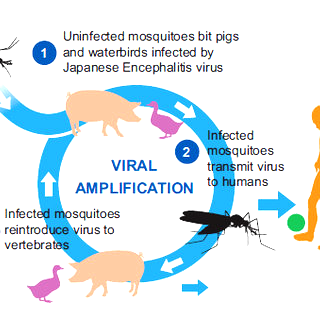Science & Technology
Japanese Encephalitis
- 21 Feb 2022
- 4 min read
For Prelims: Japanese Encephalitis, Acute Encephalitis Syndrome, Universal Immunisation Programme,NPPCJA.
For Mains: Health, Human Resource, Government Policies & Interventions, Japanese Encephalitis, transmission and prevention.
Why in News?
Recently, the National Institute of Animal Biotechnology (NIAB), Hyderabad has developed an immunosensor to detect Non-Structural 1 (NS1) secretory protein which is a suitable biomarker for Japanese Encephalitis Virus (JEV) found circulating in the blood.
- Detection of the NS1 instead of antibody has an added advantage since the antigen is present from day 1 of the infection and hence facilitates early detection. On the other hand, antibodies appear only after Day 4/5 of the infection.
- NIAB is an Indian autonomous research establishment of the Department of Biotechnology, Ministry of Science and Technology.
What is Japanese Encephalitis?
- About:
- It is a disease caused by a flavivirus that affects the membranes around the brain.
- Japanese encephalitis virus (JEV) is also a major cause of Acute Encephalitis Syndrome (AES) in India.
- Transmission:

- The disease is transmitted to humans through bites from infected mosquitoes of the Culex species.
- These mosquitoes breed mainly in rice fields and large water bodies rich in aquatic vegetation.
- Migratory birds along with pigs in the community also play an important role in the transmission of JE from one area to other areas.
- Symptoms:
- Most people infected with JE do not have symptoms or have only mild symptoms.
- However, a small percentage of infected people develop inflammation of the brain (encephalitis), with symptoms including sudden onset of headache, high fever, disorientation, coma, tremors and convulsions.
- Treatment:
- There is no antiviral treatment for patients with JE. Treatment, available, is supportive to relieve symptoms and stabilise the patient.
- Prevention:
- Safe and effective JE vaccines are available to prevent the disease.
- In India, mass vaccination with JE vaccine was started in a phased manner subsequent to the major outbreak in 2005.
- JE vaccination is also included under the Universal Immunisation Program of the Government of India.
What are the Government Initiatives Related to Japanese Encephalitis?
- In order to reduce morbidity, mortality, and disability in children due to JE/AES, Government of India under National Programme for Prevention and Control of Japanese Encephalitis(JE)/ Acute Encephalitis Syndrome (NPPCJA) has developed a multi-pronged strategy with the convergence of the concerned Ministries.
- Ministry of Health and Family Welfare: Strengthening and expanding JE vaccination, Strengthening of public health activities, better clinical management of JE/AES Cases etc.
- Ministry of Jal Shakti for the provision of safe water supply.
- Women and Child development for providing high-quality nutrition to vulnerable children.
- Ministry of Social Justice and Empowerment for establishing District Disability Rehabilitation Centres for disability management and rehabilitation.
- Ministry of Housing and Urban Affairs for ensuring the supply of safe water in slums and towns.
- Ministry of Education to provide special facilities for disabled children for their education.




